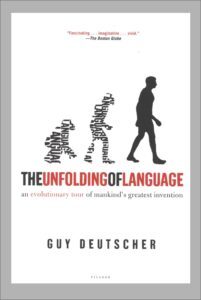Deutscher: Language Evolves

Guy Deutscher. 2005. The Unfolding of Language: An Evolutionary Tour of Mankind’s Greatest Invention. New York: Henry Holt and Company.
Review by Stephen W. Hiemstra
Few things fascinate more than linguistics. Why do we speak different languages and where do they come from? For polygots, the history and evolution of languages seems like peaking behind the curtain of the Wizard of Oz.
IntroductionGuy Deutscher’s book, The Unfolding of Language: An Evolutionary Tour of Mankind’s Greatest Invention, starts with this objective
“This book will set out to unveil some of language’s secrets, and thereby attempt to dismantle the paradox of this great uninvented invention.” (8)
Deutscher begins with an audacious claim that: “The advent of language is what made us human.” (1) Even the Einstein of chimps, Kanzi, who can recognize up to 500 words and simple sentences, cannot string together these symbols and form real sentences (17). The human brain appears pre-wired for language, even if the potential was slow to be realized (19).
Language is a uniquely human enterprise whose evolution is glacially slow, yet incessant. Strikingly, we see “pretty much the full repertoire of complex features found in any language” (9) from the beginning of recorded history some five thousand years into the past, suggesting that our ancestors were no less sophisticated than we are, contrary to the generational arrogance that is openly exhibited these days. The “me Tarzan, you Jane” (9) phase of linguistic development is unobservable in the historical record and nonexistent among remote, isolated people groups today. In fact, the most complex word structures tend to be found among small tribal groups, while simplification is more a characteristic of languages employed in large, trading cultures (272)
Deutscher sees three primary motives for language to evolve: economy, expressiveness, and analogy (62). Complexity is constantly broken down (economy), yet we strive to express our views (expressiveness) in memorable ways (analogy). Dead metaphors play a surprisingly important role in creating new grammatical elements, much like islands and rich farmland often begin life as swamps and alluvial deposits, with a flow from the concrete to the abstract (118, 142-143). Authors work hard to avoid clichés, instead expressing metaphors potentially characterized as short, concrete memes or, better yet, associating an entirely new word with their work.
Background and OrganizationGuy Deutscher (1969-) is an Israeli linguist. His undergraduate degree and doctorate are from University of Cambridge, UK. He is a writer and author of several books on linguistics.
Deutscher writes in seven chapters, preceded by an introduction and followed by an epilogue:
A Castle in the AirPerpetual MotionThe Forces of DestructionA Reef of Dead MetaphorsThe Forces of CreationCraving for OrderThe Unfolding of Language (iii)These chapters are followed by five appendices, notes, bibliography, glossary, acknowledgments, credits, and an index.
Mystery of ChangeDeutscher repeatedly and ironically refers to the hiddenness of language change and to the ubiquitous complaints about the deprecation of language. For example, why did Latin loose most of its elegant case structure once it evolved into romance languages, like French and Spanish? How can languages evolve without anyone really noticing? At this point, he begins telling stories and taking special note of small irregularities.
Suppose you go out for a movie and hear two women in the theatre describing the film as “wicked”? What impression would you get if the women were teenagers versus elderly? The context of the comments makes all the difference in how you might interpret what was said. In the same manner, words can take on meanings entirely unrelated to their origin, especially in the case of metaphor (69).
AssessmentGuy Deutscher’s The Unfolding of Language: An Evolutionary Tour of Mankind’s Greatest Invention is an interesting read. While I am not a linguist, I received this book as a Christmas present and read it over the holidays. Those that read my blog will recognize that I post in English, Spanish, and German, which makes me a polygot. I suspect that this book is required reading for introductory courses in linguistics.
Footnoteshttps://en.wikipedia.org/wiki/Guy_Deu...
Deutscher: Language EvolvesAlso see:Books, Films, and MinistryOther ways to engage online:Author site: http://www.StephenWHiemstra.netPublisher site: http://www.T2Pneuma.com Newsletter at: https://bit.ly/Seize_2022, Signup
The post Deutscher: Language Evolves appeared first on T2Pneuma.net.



